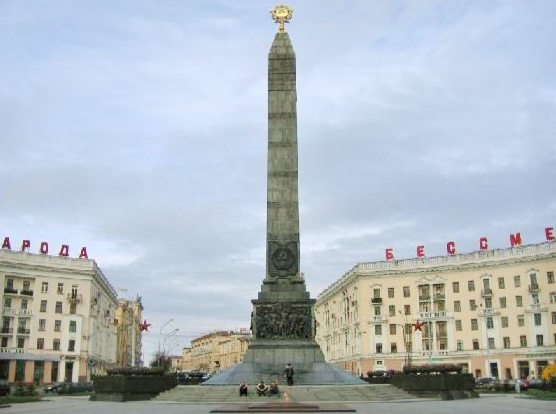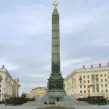
Belarus Targets Intellectual Community
Publication: Eurasia Daily Monitor Volume: 9 Issue: 204
By:

On November 5, the Russian company ROSSPEN published the memoirs of former chairman of the Parliament Stanislau Shushkevich, the first leader of Belarus after independence. The book came out in a Russian-language edition because none of Belarus’s publishers dared to issue the original in Belarusian. According to Shushkevich, they received a warning that if they did so, it would be the last book they published (Euroradio for Belarus, November 2). The event symbolizes the current crisis of intellectual life in Belarus and the near monopoly the government wields over publications, especially about the recent (Soviet) past.
Over the past few weeks, Belarusians have witnessed a rather unusual contrast. On October 16, President Alyaksandr Lukashenka featured on the Russian RT network to give his views on Soviet history. He declared that figures like Lenin and Stalin “should not be demonized. They were our leaders,” noting that Lenin created the Soviet state and Stalin “strengthened it.” Europeans, he stated (with withering disregard for German historians), “do not criticize their own history. So why are we not allowed to be proud that we had a Soviet empire?” (RT, October 16). Two weeks later at a meeting with activists of the United Russia Party, Russian Prime Minister Dmitry Medvedev voiced a different view, observing that Stalin in effect declared war on his own people and that the repressions of that period should not be repeated. It is therefore necessary, he said, “with maximum objectivity to appraise historical events” (dp.ru, October 30).
In Belarus, the leading non-governmental intellectual magazine is ARCHE, which was established in 1998. According to its self-description, ARCHE is an independent bi-monthly magazine that covers political and academic thought and literature from Belarus and abroad and is especially popular in university circles (eurozine.com). Its editors maintain that the Belarusian special services wish to control the market for book production in order to control the minds of the readership and foster an imposed post-Soviet-Russian identity on Belarusians, nurtured by Russian colonial history. Therefore, critiques of Sovietization of Belarus under the USSR represent challenges to the current regime, which has maintained and promoted the myths and glorification of the Soviet past (arche.by, November 3).
On September 14, the editor-in-chief of ARCHE, Valer Bulhakau, was in Hrodna to launch a new book published by the editorial board and authored by Yan Shumski entitled, “The Sovietization of Western Belarus.” The book was one of a series on this same topic. Tax inspection officials from Hrodna Regional Council stopped the presentation, accusing Bulhakau of “illegal entrepreneurship” for not having invoices for all the books in his possession. The officials confiscated 194 copies. Subsequently the Hrodna Economic Court fined him 500,000 Belarusian rubles ($58) and also seized monies received for copies sold—an estimated 875,000 Belarusian rubles ($100). The fines seem like token amounts by Western standards, but ARCHE faces a struggle to survive. Bulhakau resigned as editor-in-chief in order to keep his personal plight from affecting the magazine. The state also seized 20 different titles published by the magazine, claiming that they offered a distorted interpretation of Belarusian history during the World War II Nazi occupation. In fact, only two of these confiscated books focused on the war, discussing the question of whether Stalin had planned to attack Nazi Germany in 1941. Other titles taken from Bulhakau included books on medieval Poland, the Grand Duchy of Lithuania, the Battle of Grunwald (1410), and the formation of the Belarusian National Republic in 1918 (Nasha Niva, October 31).
After the confiscation of ARCHE’s literature, the authorities began to audit the magazine, in order, in its own words, “to dig up dirt” that would allow the filing of a criminal case. The Hrodna episode is the fourth time the regime has targeted the magazine, but evidently it is the most severe attack to date (arche.by, November 3). Along the same vein, in September, the Hrodna State University dismissed historian Andrei Charniakevich for “harsh violations of work discipline,” but evidently the real reason was that he published a book on the history of Belarus that ended prior to the emergence of Lukashenka as president (ehu.lt, October 12). On October 8, a Belarusian-speaking professor at the same institution’s law faculty was also pressured to sign a “voluntary resignation agreement” after he authored some children’s fairy tales that featured the Pahonia, the official coat of arms of the Belarusian National Republic of 1918, as well as the white-red-white flag used at that time—also associated with the 1991–1995 emblem banned in Belarus after a state referendum in May 1995 (charter97.org, October 8).
In short, therefore, a plethora of topics are now taboo for Belarusian academics and intellectuals. Moreover, the situation has worsened considerably in recent months. In 2008, for example, customs officials targeted Alies Pashkievich (then deputy editor and now editor-in-chief of ARCHE), confiscating books on the Grand Duchy of Lithuania as well as some that featured current Belarusian politicians. Yet, after ARCHE appealed, the Belarusian KGB backed down and the books were returned (Nasha Niva, October 31). Two years later, historian Illya Kopyl published a series of articles in the Belarusian language about wartime partisans in the village of Niabyshyna (Viciebsk Region), Belarus, in the newspaper Narodnaya Volya. The authorities issued an official warning to the newspaper, which was picketed by alleged veterans, some of whom seemed too young to have been in the war, as well as by the Union of Patriotic Youth, a pro-Lukashenka organization that occupies the headquarters of the former Komsomol (charter97.org, Jun 2, 2010).
As these examples indicate, the Lukashenka regime is extremely sensitive about the historical past. It has fostered a single interpretation of the Soviet years that not only continues the glorification of the Great Patriotic War, but also manifestly ignores the Stalinist repressions, including the NKVD massacre of prisoners at Kurapaty on the outskirts of Minsk, where mass graves were uncovered in the late 1980s. Monuments erected there are regularly violated. Most recently, a memorial sign initiated by historian Ihar Kuzniatsou to recognize the Polish army officers executed at Kurapaty during WWII has disappeared (charter97.org, October 31). Some 25 kilometers to the northwest, one can find a bust of Stalin adorned with wreaths at the entrance to the Stalin Line Museum, founded in 2005 by the Afghan Veterans Association and visited regularly by Lukashenka. The Museum, based on a myth of a fortified line that delayed the German attack on Moscow, corresponds to the official version of the Soviet past. The Lukashenka presidency has defined the modern state based on Soviet myths and respect—if not glorification—for the “achievements” of Stalin as a ruler. Lukashenka perceives himself as a strong leader continuing past traditions. His regime, therefore, targets any individual, newspaper, journal, or magazine that questions the official perspective for the crime of “historical revisionism.” Bulhakau is the latest victim.




